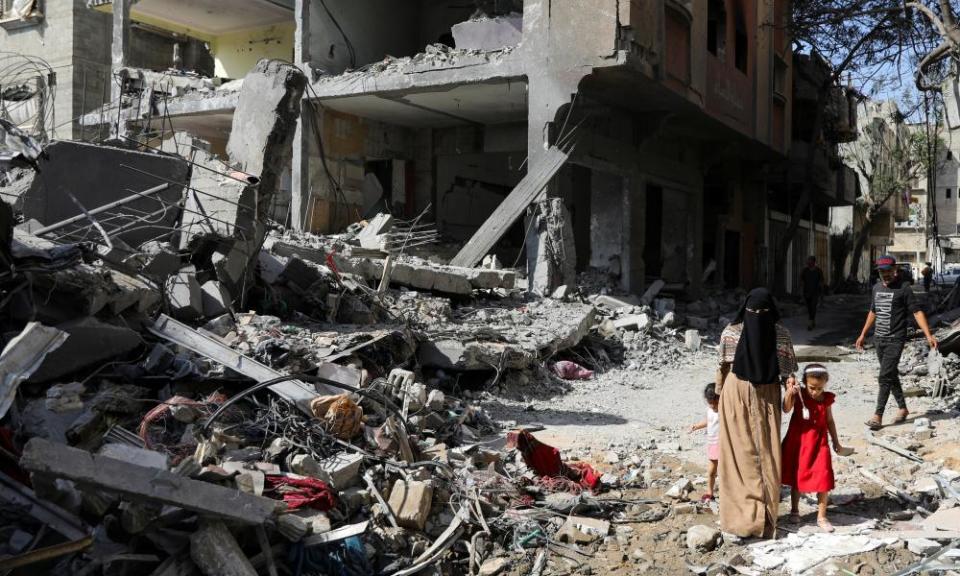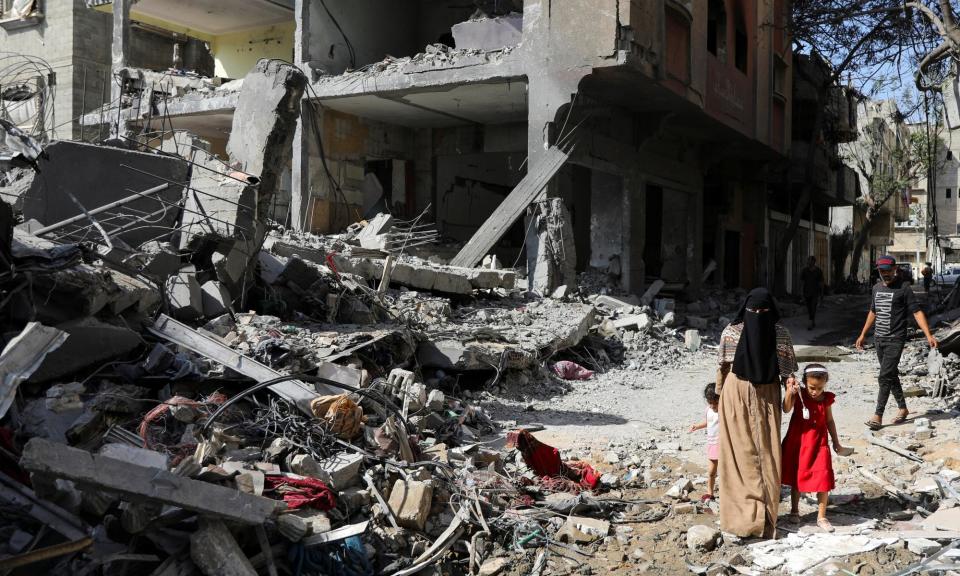US to ask UN security council to back Joe Biden’s Gaza peace deal
The US is to try to shore up support for its proposed Gaza ceasefire deal by asking the 15-strong UN security council in New York to back a resolution supporting the deal.
Washington is struggling to gain the unequivocal backing of Israel or Hamas for a three-stage deal proposed by the US president, Joe Biden, that would lead to the release of all the remaining hostages in return for Israel accepting steps towards a permanent ceasefire and the eventual withdrawal of its forces from Gaza – two key Hamas demands.
A vote is expected later on Monday, following the US finalising the text on Sunday after six days of negotiations among the 15-member council. It was not immediately clear whether Russia and China would veto the draft, which needs nine votes and no vetoes to pass. The US, an Israeli ally, has previously vetoed draft resolutions calling for a ceasefire.
The US secretary of state, Antony Blinken, is visiting the Middle East this week, his eighth trip to the region since the 7 October Hamas attack on Israel, to make a further push to nail down support for the deal, focusing on his demands for Hamas to back it. “My message to governments throughout the region, to people throughout the region, is if you want a ceasefire, press Hamas to say yes,” he told reporters before departing Egypt for Israel.
“If you want to alleviate the terrible suffering of Palestinians in Gaza, press Hamas to say yes. If you want to get all the hostages home, press Hamas to say yes.”
After months of failed peace efforts, Biden went public on 31 May on a plan for an initial cessation of hostilities that would turn into a permanent ceasefire and the full withdrawal of the Israel Defense Forces from Gaza.
Related: Israel-Gaza war live: Netanyahu to decide on future of war cabinet after Gantz resigns
The draft UN resolution backing his proposal suggests the move to phase two and the permanent end of hostilities will occur “on the agreement of both parties”, but says if the negotiations to reach that stage take longer than six weeks, “the ceasefire will continue as long as the negotiations continue”.
It says the US, Qatar and Egypt will work to ensure the negotiations keep going until all the agreements are reached and phase two is able to begin.
The US assumption behind the proposal is that Hamas is no longer a military threat to Israel and the best route to secure the release of more Israeli hostages is through diplomacy and not through the kind of violent weekend operation that resulted in four hostages being rescued but killed hundreds of Palestinians, according to Gaza’s health ministry.
Sunday’s resignation of the centre-right former defence chief Benny Gantz from the Israeli emergency war cabinet and continued demonstrations by hostage families is putting pressure on the Israeli prime minister, Benjamin Netanyahu, to accept the resolution and the diplomatic path underpinning the plan.
In a bold effort to show negotiations with Hamas can produce results for Israel, NBC News has reported the Biden administration is considering entering into a deal with the militant group that does not include Israel.
Citing two current and two former US officials, the American broadcaster said a deal to free five American hostages would be hammered out through Qatari mediation if the effort to reach a comprehensive agreement failed.
The officials did not know what the US could offer Hamas in return, but argued there was an incentive for Hamas to drive a deeper wedge between Biden and Netanyahu. Parts of the Biden administration would like to see the Netanyahu coalition government collapse, leading to fresh elections and the formation of an Israeli government more willing to seek an understanding with the Palestinians. They believe the complete obliteration of Hamas militarily is a mirage and say Netanyahu has no realistic plan for Gaza’s future governance.
Full details of the Biden peace plan have not been publicly disclosed, but controversy has centred on whether the proposal provides the guarantees that Hamas says it needs that Israel will be forced to accept the transition from stage one to stage two of the deal.
The senior Hamas official Sami Abu Zuhri urged the US on Monday to pressure Israel to end the war in Gaza. “We call upon the US administration to put pressure on the occupation to stop the war on Gaza and the Hamas movement is ready to deal positively with any initiative that secures an end to the war,” he said.
The Israeli envoy to the UN, Gilad Erdan, has told the US delegation that Israel is opposed to language iin the draft resolution referring to the hostage deal as one that will bring about a “ceasefire”, as opposed to an earlier version that described the end goal as a “cessation of hostilities” that Israel regarded as less permanent in nature.
Israel also objected to the updated draft’s call for both sides to fully implement the latest hostage deal proposal. The earlier version only called on Hamas to accept the proposal; the updated draft does the same, but also notes that the latest hostage deal proposal is “acceptable to Israel”.

 Yahoo News
Yahoo News 

